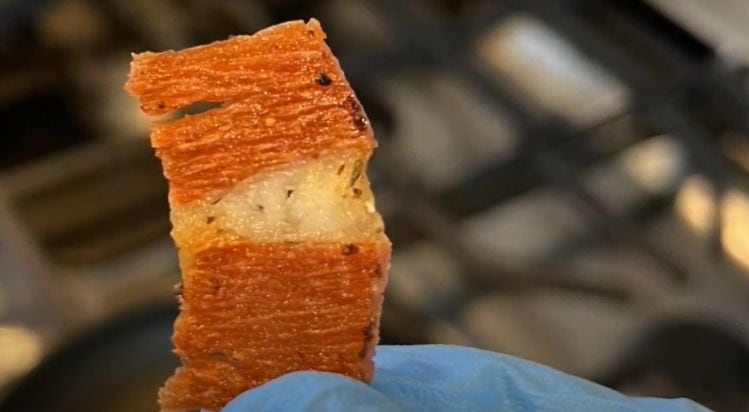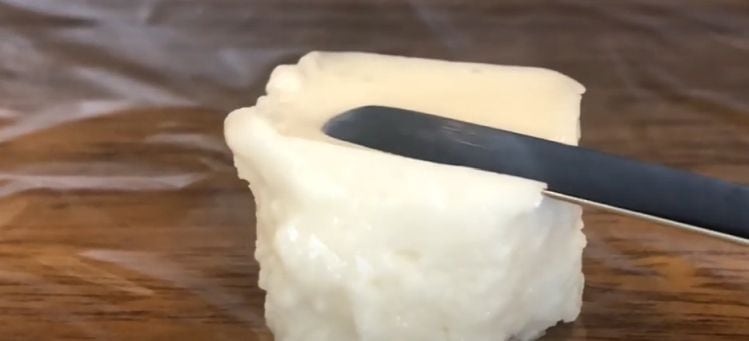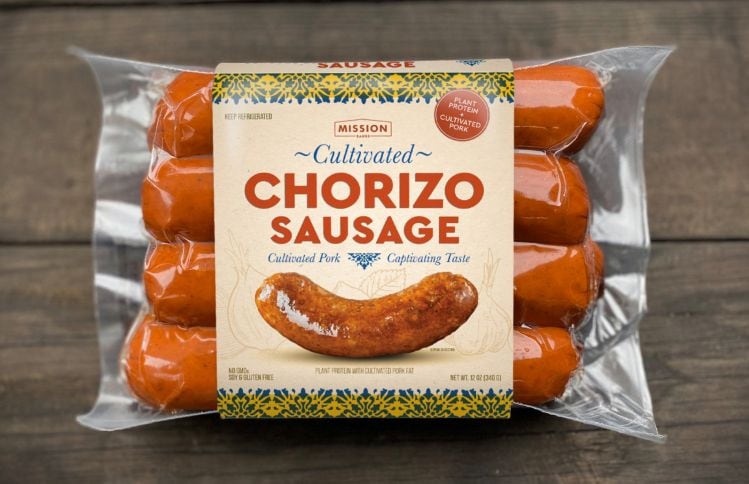Most plant-based burgers currently on the market include a hard fat such as coconut oil, which is high in saturated fat, doesn’t taste like animal fat, and melts when the burger starts cooking, leaking out of the food matrix.
As a result, the race is on to find alternatives with better functionality, flavor, and environmental credentials, with some foodtech startups such Yali Bio, Zero Acre Farms, c16 Biosciences, and Nourish producing animal-like fats via engineered microbes; while others such as Mission Barns are creating ‘real’ animal fat (without animals) in bioreactors from animal cells (although this would clearly compromise a burger's 100% plant-based credentials).
Motif FoodWorks meanwhile, is developing oleogels that trap liquid oils within an ethyl cellulose scaffold to create fats that can be co-extruded with plant-based proteins, creating a “veining and marbling effect" emulating conventional meat.
‘We are creating a structured fat with a very high melting point that can be up to 400 F, and nobody else can achieve that’
Sunnyvale-based startup Lypid, by contrast, is taking a different approach, microencapsulating liquid plant oils in water to create spongy fats with very high melting points, co-founder Dr Jen-Yu Huang told FoodNavigator-USA.
“The challenge is that vegan fats - even harder ones like coconut oil - actually still have a very low melting point, so the appearance after cooking isn’t right and the texture isn’t right as the oil leaks out.”
PhytoFat, however, maintains its animal fat-like qualities when heated above 329°F (165°C), keeping more fat in a burger as it cooks, claimed Huang, who said the seed round - led by Green Generation Fund with additional support from Big Idea Ventures, SOSV’s IndieBio, and others - would help Lypid scale up manufacturing, with the longer-term plan to produce up to 10 tons of PhytoFat per year.
“We are creating a structured fat with a very high melting point that can be up to 400°F, and nobody else can achieve that. It works well in ground products like burgers and meatballs and things like bacon and salami.”

PhytoFat ‘looks and cooks like intramuscular fat tissue’
Lypid’s microencapsulation technology, which can work with a variety of vegan oils from sunflower to olive oil, creates an emulsion (oil droplets surrounded by water) that has the rheological properties of animal fats, claimed co-founder Dr Michelle Lee, who met Huang at Cornell University (where they were both completing PhDs), formed Lypid in 2020, and participated in IndieBio ( the startup accelerator run by VC firm SOSV) in 2021.
“It looks and cooks like intramuscular fat tissue. If you just put it in a pan on its own, it looks like pork back fat, and you can get some browning on the surface. A lot of people have been able to reach a higher melting point [for fats] by using encapsulation, but not using food grade ingredients.”
The Lypid technology is also tunable for different applications, said Huang: “So for plant-based chicken applications you probably don't want solid, visible fat, so you want something more like a paste [whereas in beef products, he said, you might want visible globules of fat distributed throughout the product].”
Animal-fat-like performance, without the saturated fat
While PhytoFat would typically be added at the end of the formulation process, he said, “At the same time, we also see the possibility that we can add our fat during the extrusion process.”
As the emulsions deploy liquid plant based oils, which comprise mostly monounsaturated fat, firms using PhytoFat can slash saturated fat levels as well as improve juiciness and bite, and still retain a clean label, claimed Huang, who said the ingredients used to create the emulsions were all GRAS.
“We have several different formulations, and we usually use a mix of different oils including sunflower, and the other ingredients [which help create the emulsion] are vegetable fibers, gums or proteins that are all GRAS, so we probably don’t need to file a GRAS determination [for PhytoFat].”

‘Fat is a very important flavor carrier’
But what about flavor? Even if you can make plant oils behave like animal fat, can you make them taste like it?
While sunflower oil doesn’t taste like lard, conceded Huang, Lypid’s microencapsulation technology enables the incorporation of flavors into the plant fats, and is protected via a suite of patent filings.
“Fat is a very important flavor carrier, and our system can extend the delivery of flavors and retain them even through the cooking process. But we can also tune the different lipid profiles to try to better mimic meaty flavors.”
So how scalable is Lypid’s microencapsulation technology?
“We need more data points,” acknowledged Huang. “That’s why we’re raising money.”



